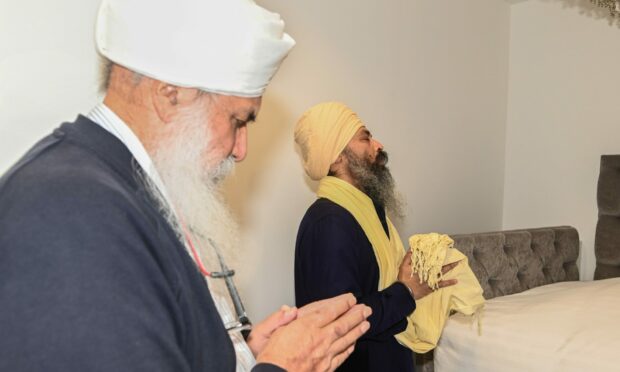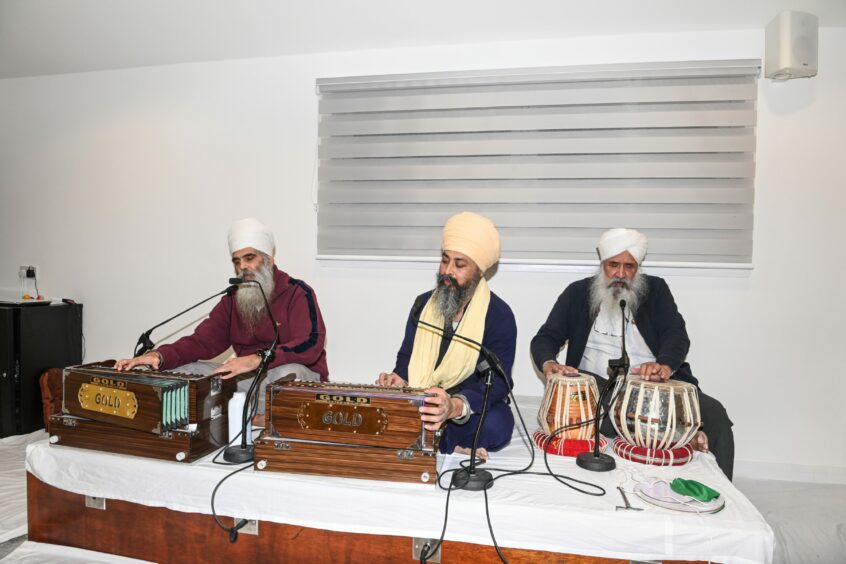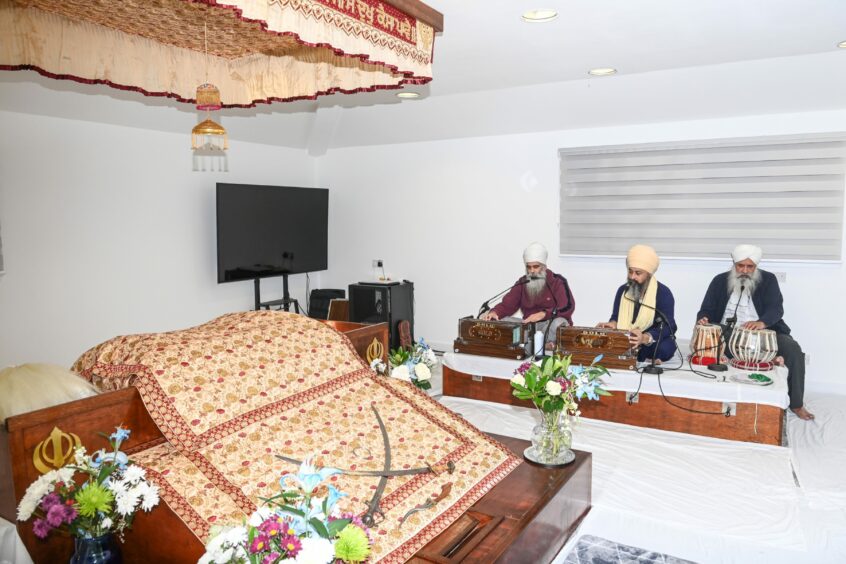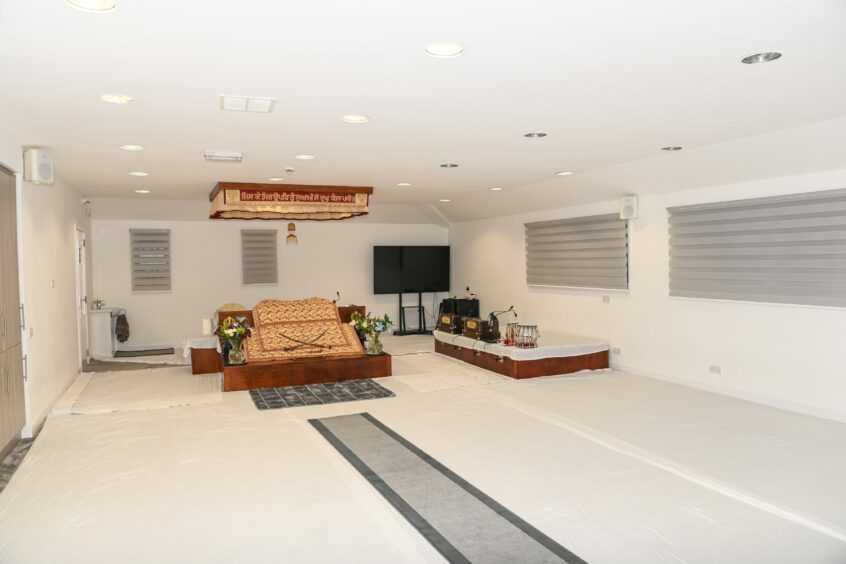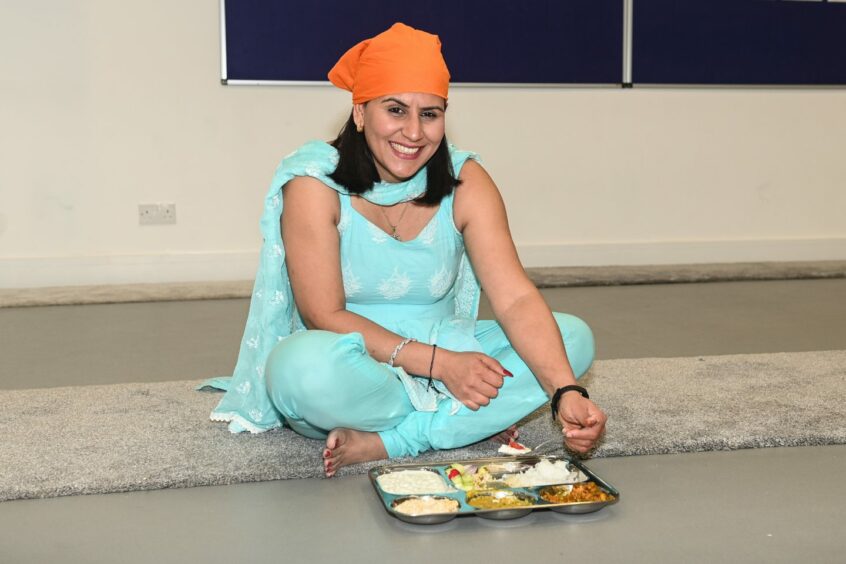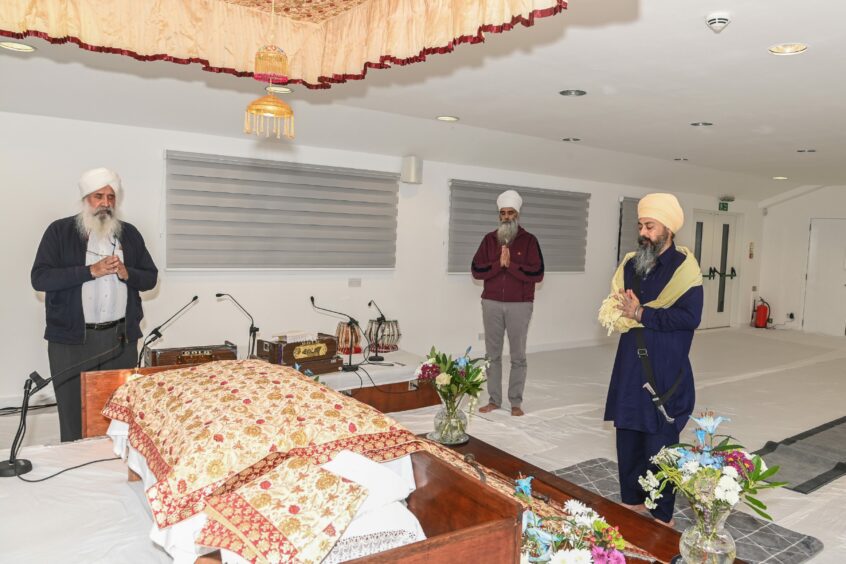The soft vibration of drums as hands skim the surface, and voices blend together.
I know not what the words mean, but the steady chanting seems to gather me in its calm.
The air shimmers, and my breathing gently slows.
White sheets cover a grey carpet as three men continue to pray.
Eyes closed, legs folded and bare feet tucked under – it is believed that meditation is the way to God. Or rather, to oneness.
There is no grand finale, rather a natural ending as the music fades away.
But unlike your standard yoga class, there is no rush to the door or fumbling for keys.
We slowly retreat from the room, careful not to turn our back to The Guru Granth Sahib (the holy book of scriptures) which has been placed on a raised platform.
The beautiful wooden structure, which is called a Takht or Palki Sahib, meaning a throne, sits under a canopy, which is called Chandoa Sahib.
The rich colours of gold and red hint of the importance, as do the beautiful flowers carefully arranged in vases. The gleaming platform was made by the expert hands of Manmohan Sangri.
He dismisses the praise, keen to point out that everyone volunteers their services in the community.
The holy scriptures of Guru Granth Sahibare are kept in a special room of their own, known as the Sukhasan, at night time, and carried in procession to the main hall at the start of the day’s worship.
We head back through to the langar hall, or community kitchen, where enticing smells make my stomach rumble.
The food is dished out by Geeta Singh, and we sit cross legged on the floor to eat after the meal has been blessed with prayers.
Manmohan jokes that his knees are not quite up to the task, and opts to sit at the table, but there is still a great feeling of togetherness.
There is mixed vegetable curry with paneer (Indian Cottage cheese), daal tadka, fluffy rice, raita which is a cooling yogurt, salad and sewaiya, a dessert which is wonderfully sweet
Anyone can come to the langar, regardless of religion, gender or background.
The Sikh community asks no questions, for one of their most basic foundations is based on the principle of equality.
This is Aberdeen Gurudwara, where the Sikh community come together to worship and celebrate.
I am ashamed to admit that I did not realise the building was here, surrounded by high-rise flats in the Seaton area of Aberdeen.
Previously a children’s nursery, it has been completely revamped by Aberdeen Sikh Sangat, a charity which hopes to spread the word of Guru Nanak across the region.
The community recently celebrated Bhandi Chor Diwas ( meaning prisoner-release) which falls on the same day as the Diwali festival, celebrating the act of selfless liberation of 52 Hindu Princes by the 6th Sikh Guru Hargobind Rai.
It is comparable to Christmas in terms of importance for Sikhs, Hindus, Jains and even some Buddhists
But what does it mean to be Sikh in the north-east, and to come together at the most northerly Gurudwara in the UK?
I spent the evening with members of the Aberdeen Sikh community to find out.
The importance of equality
The street lights are glowing when I arrive just after 5pm, and Sukjit welcomes me in the cloakroom area.
I remove my shoes and socks, and then cover my hair with a blue scarf. Sukjit is also bare foot, and and wears a white Turban or Dastaar to cover his uncut hair kesgi – which is part one of the Sikh five K’S
As explained later in the evening, when worn together the five K’s symbolises that the person wearing them has dedicated themselves to a life of devotion and submission to the Guru.
They consist of the Kesh, where uncut hair is covered with a turban or head covering; a kara, which is an iron bangle to remind Sikhs to do good and remember God in their actions; a kanga, a wooden comb used twice a day to comb hair; the Kirpan, which is a small sword worn at all times as a reminder to stand up against oppression; and finally the Kashera – underwear worn by both sexes to represent modesty and self restraint in order to live a pure and honest life.
But far from being a religion of huge restriction, the community believes that Sikhism can best be described as a type of spirituality and way of life.
“The building consists of three halls, and we have five trustees for the charity,” says Sukjit, who is a chemical engineer and moved to Aberdeen in 2011.
Geeta is equally welcoming, and tells me that in 2008, students who were studying at the universities got together for congregation and prayers in their homes every Friday. The nearest Gurudwara was in Dundee.
“People were gathering in quite small houses at times on a weekly basis and the charity was formed in 2012,” says Sukjit.
“We finally opened here last year, and now have a place of worship.
“From 2010 we started annual gathering in addition to the weekly gathering. We invite guests from all over the UK for annual gatherings. Around 100-150 people attend.
“Around 40-50 is the average size for the group of people who come here on a Sunday.”
The trustees are quick to point out that all are welcome through the door, however.
“It is a fundamental part of Sikhism, that anyone is welcome,” says Manmohan, with quiet conviction.
“Regardless of what religion you are, everyone is welcome.
“People just turn up at the langar hall, we don’t ask who they are.
“This is a place where everybody sits down together to eat, regardless of status. Rich or poor, there is no VIP treatment. It is a free meal.
“There are lots of people who wish to contribute. Donating the food, preparing or serving it.”
The charity is currently in tentative talks with various other charity groups, who who put together food parcels. Aberdeen Gurudwara is open to working in partnership with any local charitable group to help serve the local community where there is a need.
A way of life
As I tuck into the delicious food, which is served on a metal tray and eaten with a spoon, prayer can be heard over the loud speaker.
Raj B Singh is the resident Granthi Ji at Aberdeen Gurdwara. This means he stays in accommodation on-site, organises the daily services and reads from the Guru Granth Sahib.
He is fluent in reading Gurmukhi, and there is a quiet stillness about him. Perhaps because he is an initiated member of the Sikh Khalsa, and lives his life by the ideals of the Sikh Khalsa.
Although the granthi is trained in all aspects of looking after the Guru Granth Sahib, any Sikh can lead the prayers and recite the scriptures to the congregation.
“Prayers happen seven days a week,” explains Sukjit, who sits cross legged with ease despite his tall height.
“People can attend from six till eight in the morning, and six till eight in the evening, which can be better for those who have work. There is also the main congregation that takes place every Sunday from eleven am till one pm.
“In places such as Birmingham, the Gurudwara is open 24 hours a day alongside the langar.
Five prayers are read from the holy scripture, followed by musical meditation. This plays a big role in achieving oneness.
“It’s poetry and musical chapters. The vibration connects with the inner soul.
“It is a different word, an energy and a power which comes from the scripture.”
The group explains that the oneness of humanity is a key Sikh principle, meaning all humans are equal.
“We believe in one God, but we don’t assign a gender,” says Sukjit.
“It is a formless universal power. When you look around you at the universe and think something has created all this. It cannot have a name, because how can you describe what is indescribable?”
Manmohan, whose knowledge seems endless, tries to explain the concept.
“We are the fifth-largest religion in the world, it all started from one. On the very first page of the holy scripture, is the number one,” he says.
We work on attaining that oneness, and we believe that the same force runs through everybody.
“There is but only one God, with no beginning and no end. Infinite, everything starts from this.
“It’s about understanding our vibrations and our harmony.”
Helping the community
The group is now on a mission not only to educate others about Sikhism, but also become more entwined with the community.
For Geeta, who is a tax accountant for an oil and gas firm, fundraising has become a huge part of what the group is trying to achieve.
Wearing a turquoise kameez, which is a dress top, teamed with matching salwar, which is loose-fitting pants, and a bright orange head covering, she is clearly at the helm of the community kitchen.
She only sits down to eat once everyone has been served, despite repeated requests from Sukjit to tuck in.
“We want people to know we are here, and that we want to be of service,” says Geeta, who came to the UK to study in 2015 before going on to settle in the north-east.
“Money raised from our Diwali dinner, which is the biggest Indian festival and equivalent to Christmas, went towards the Afghan Refugee Support Council.
“Our annual celebration of the charity is also a little bit special.
“It lasts three days and food is provided around the clock. The holy scriptures are also read from start to finish; we have a rota with people taking two-hour stints.
I think Sikhism is more like a way of life. It’s like a universal language, and there is a bit of every religion in there.
“People have been very accepting of us here in Aberdeen, and they always seem interested. We want to educate people, it’s not about forcing an ideology on them.”
“Weekly Wednesday community football was initiated in summer at one of the playing fields behind the Gurudwra . We had ages seven to 60, boys, girls, men and women
There are already exciting ideas afoot, with plans to potentially re-utilise some of the football pitches which are seldom used, tocreate a special space for the whole community to enjoy.
“We’ve sent suggested tentative plans to the council for a generational park,” says Sukjit.
“The vision is a place where people of all ages and from all communities can come together. The whole local community would need to be on board with the idea before taking such a substantial project further.
“We’ve also adopted a corner of grass in Seaton on School Road. We have so far painted the benches, scattered wild flower seeds and we’re going to be planting spring bulbs in the coming weeks, prior to more substantial planting and landscaping in the spring.
“The hope is for a community garden.
“Service, which is called sewa, is a way of life for us.
“It shows our belief in equality, in humility and in people.”
